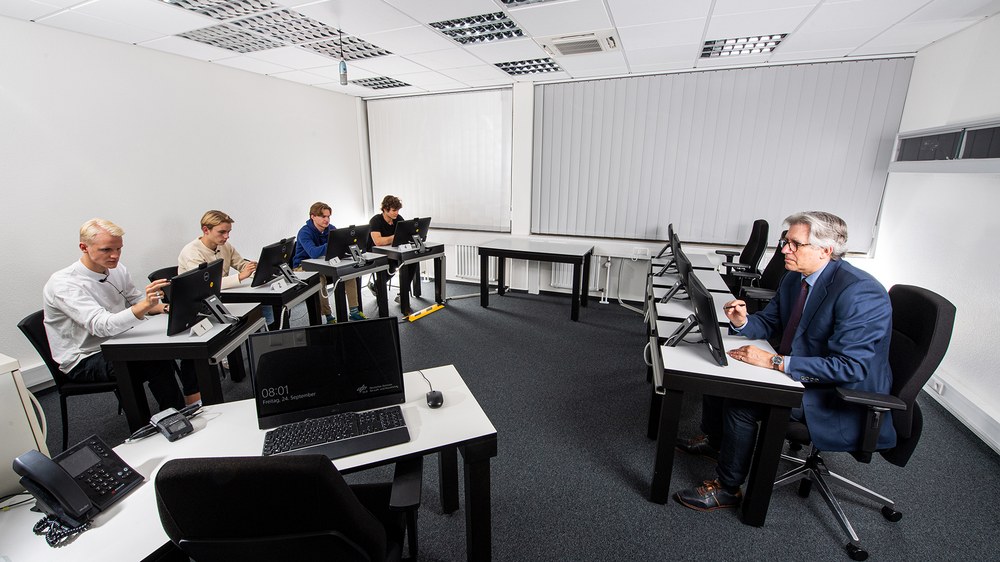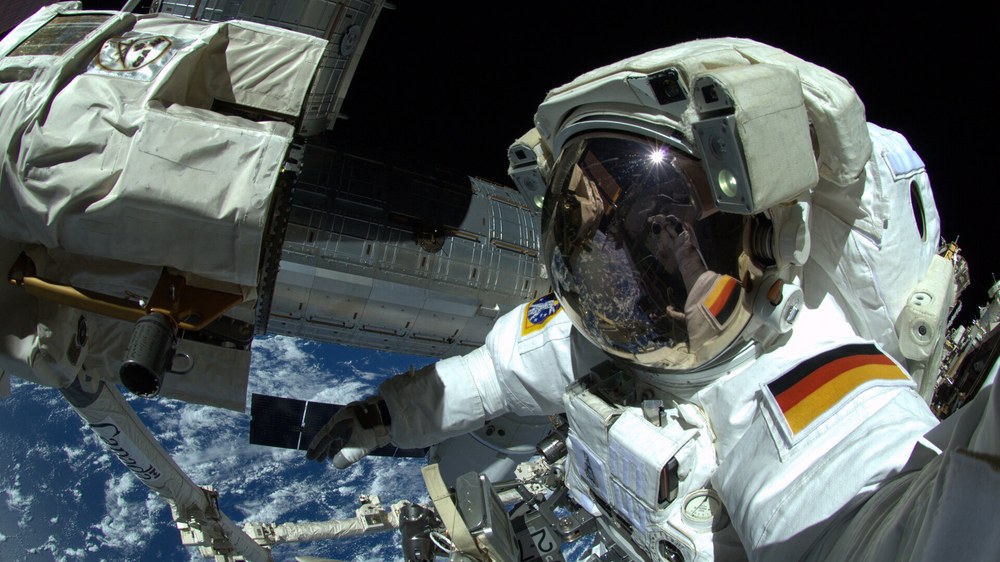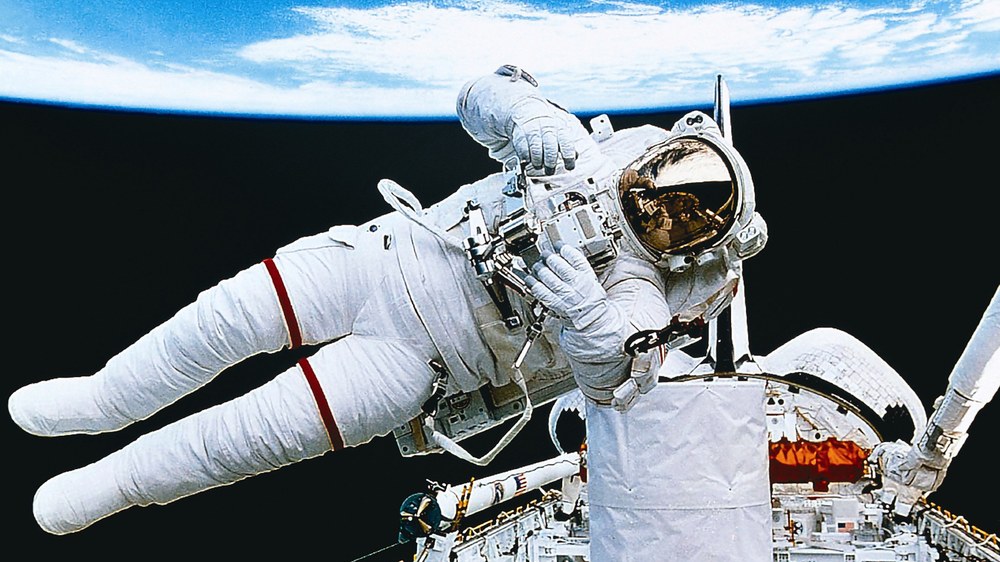Finding the right candidates using psychology
When humans set foot on the Moon again in the next few decades, it is very likely that Viktor Oubaid will have already met the European astronaut. Chances are that he knows how this person works in a team, how good his or her memory and concentration skills are, as well as the astronaut's motivation for applying for this somewhat special profession. Oubaid is a psychologist at the DLR Institute of Aerospace Medicine and was part of the selection team for both the astronaut class of 2008 and the new astronaut class of 2022.

He could also have pursued a career at the University of Halle, where the psychology graduate had actually made a very good impression after studying in Bielefeld and completing his doctorate in Heidelberg – had he not come across the DLR job advertisement for an aerospace psychologist at that time, and if he hadn't, as a child, watched Neil Armstrong set foot on an extraterrestrial celestial body. All of this has led Oubaid to test the aptitude of aeroplane pilots, air traffic controllers, helicopter pilots and potential astronauts for the past 23 years. "It was clear to me that this was something I wanted to do in my life," says the 57-year-old.
Mentally fit to work in space
The European Space Agency (ESA) selected approximately 1500 qualified applicants from the many submissions and sent them to DLR in Hamburg for psychological aptitude tests. Oubaid and his team examined the applicants to determine which of them possessed the cognitive and mental skills needed to take off in a rocket towards microgravity and to live and work there, perhaps for months at a time. Retention, concentration, multitasking qualities, perception speed, technical knowledge, English skills and even mental arithmetic were among the areas of mental performance that were examined in tests and then evaluated by DLR psychologists.

Only a good 300 applicants were recommended to ESA for the second stage. "We only recommend individuals who have achieved a certain level of performance in all areas," explains DLR scientist Oubaid. "Those who have poor memory skills cannot make up for it with mental arithmetic." Even before their tests, the invited applicants receive training modules to prepare themselves as best they can and to familiarise themselves with the tests. One thing, however, is never divulged: "We don't tell anyone what the perfect mixture is - that remains a secret, like the recipe for a special sauce".
Getting to know the person
The second psychological selection stage then took place at the very place where the astronauts of 2022 will spend a great deal of their training time: ESA's European Astronaut Centre (EAC). "During this process, we took an even closer look at each and every one of the candidates." How do the applicants behave in the team? How do they share information, how do they plan processes and how do they make decisions? In addition to these observed situations, the psychologists also conducted several interviews to get a better picture of the candidates' motivation, personality and life paths. "We want to get to know the candidates as individuals," emphasises Viktor Oubaid. "As an astronaut, you float in a tube in space, it's noisy, the lights are on permanently, you have a heavy workload and are almost always surrounded by other people – for half a year." An introvert who is exposed to this would quickly have difficulties concentrating under these conditions for a long period of time. On the other hand, people who are too extroverted might talk a lot and would be reluctant to take on work which has to be carried out individually. "We are looking for level-headed people with stable personalities, not extreme types."
Cell phone off and head empty
Oubaid prepares routinely for these test days. In the morning, the mobile is switched off. By doing so, he tries to prevent an annoying email from influencing the psychologist during the interviews. Those who might come to work on the very day of the test after a car accident or family problems have to ask themselves whether they can be involved in the candidate tests. A cluttered brain dealing with many things at once is not desirable: "We come to the psychological tests with the greatest possible inner 'calm' in our minds." What if the door opens and the applicant entering reminds a psychologist massively of an unsympathetic relative? Or perhaps the common hometown makes the candidate very likeable? "We are professionals and recognise our own, sometimes simply human biases." Furthermore, in the second stage of the psychological evaluation, the applicants meet a large and diverse team that makes the assessment together. "You also often have a gut feeling because of your own experience – and I am always very sceptical about that. The trick is not to ignore the intuition, but to confirm or refute it with scientific facts."
Professions that get down to business
The future astronauts are not the only ones the psychologists at the DLR Institute of Aerospace Medicine deal with. " Actually, it's the professions where it gets a bit down to business," says Oubaid. Air traffic controllers, helicopter pilots for emergency missions, airline pilots, once also research divers. "Through our research, we are working to make these industrial and societal sectors safer." If, for example, plans are being made to staff aircraft with only one pilot in the future, this will have a major impact on these pilots. A professional life in which people only work with humans on the radio or with artificial intelligences needs to be explored. "This has consequences for the work situation, the training and above all for the psychological stress of the pilots." The aerospace psychology department, which has a staff of around 50, is also involved in selecting the right test subjects, who spend weeks at a time as part of DLR's bed rest studies at the :envihab research facility.
Success confirms the expertise of the aerospace psychologists. Of the tested and selected aircraft pilots, 95 percent completed their decades-long professional careers without any incidents. And the astronauts of 2008 have proven to be faultless during their missions in microgravity and are held in high esteem by the US space agency NASA. "So I think we're very much on the right track with our scientifically based recommendations." And even if the recipe for good astronauts cannot be revealed, the list of necessary ingredients quickly becomes clear: balance, the ability to work in a team, nerves of steel, commitment and the ability to work under pressure are just some of the demanding requirements.


